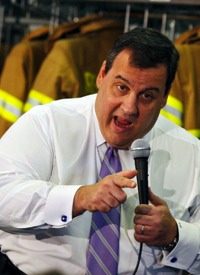
New Jersey government, according to almost every objective observer, is badly broken. The pay and the pensions of state employees are a primary problem. Governor Chris Christie of New Jersey has declared that he will fix New Jersey’s state of affairs by doing amongst other things, "ending the practice of providing automatic incremental budget increases across the board, or requiring across-the-board cuts in programs" and relying "on recurring revenue to balance our state budget, not one-shot gimmicks like federal stimulus aid or other revenue unlikely to recur in future years."
Acknowledging the political clout of public employees unions, which have cowed past Governors of New Jersey, who hold an office that has substantially more power than the Governors of other states, Christie has said he will act as if he was going to be a one-term Governor. Christie, who was mocked in the 2009 election campaign for being too stout in physique, is proving stout in another way too: He has stuck to his word and insisted that state employees accept a wage freeze and that they contribute more to their own health insurance. On paper, these changes seem modest. When unemployment nationally is very high, simply accepting a temporary freeze on wage increases is only common sense. (It would be interesting to know how many applicants would apply for those New Jersey state jobs, even with a wage freeze, if the jobs were open.)
Public employees unions, however, are accustomed to getting everything their way. So a huge rally in Trenton, estimated at over 30,000 people, reported to be the largest such gathering in state history, was put together to protest Governor Christie’s austerity plans. No one was surprised.
It remains to be seen if these hordes of state employees can twist the arm of Governor Christie? So far, the answer appears to be “no.” Christie has so far ignored public opinion polls that show his popularity to be tanking, simply commenting that these state employees have every right to speak their mind. The greater question may be whether the other politicians in Trenton can take the heat. Although the Governor of New Jersey has a lot of clout under that state’s constitution, a terrified State Legislature can override his veto and force his hand.
What will happen is uncertain, but Christie was the voters’ choice, and his campaign, which matched closely the message of Republican state legislative candidates, could hardly have been clearer. Counter-pressure could build on politicians in New Jersey state government to put the general welfare ahead of the welfare of public employees unions. But few states were as dysfunctional as New Jersey when Christie won election in 2009. New Jersey seems to have all the makings of a “High Noon” in American politics. Stay tuned.
Photo of Governor Chris Christie: AP Images



